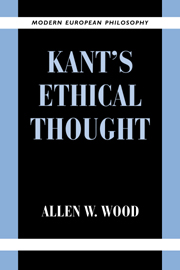6 - The study of human nature
Published online by Cambridge University Press: 05 June 2012
Summary
Practical anthropology
I.I. Metaphysics of morals and anthropology The Groundwork divides moral philosophy into two distinct parts: the metaphysics of morals and practical anthropology (G 4:388). The first of these alone is said to be “morals proper,” and it is supposed to provide us with the “laws according to which everything ought to happen.” These laws are to be entirely unmixed with any information about what does happen. Hence it is to be completely separate from everything we know about human nature through experience. In the Groundwork Kant regards the two departments of moral philosophy as so separate that he even wonders whether they shouldn't be pursued by different researchers in order to take advantage of the benefits of an intellectual division of labor (G 4:388–389).
In the Groundwork it remains extremely unclear what either a “metaphysics of morals” or a “practical anthropology” would look like. The Groundwork is not a metaphysics of morals but only lays the ground for one by formulating and establishing its first principle. It is unclear what it would be to go beyond the fundamental principle of morality and develop a system of practical laws and duties, while still making no use whatever of empirical information about human beings.
Kant seems to want to have even less to do in the Groundworkwith practical anthropology, since he appears to cast himself for the purposes of that work as someone better suited to the metaphysical side of moral philosophy than the empirical or anthropological side.
- Type
- Chapter
- Information
- Kant's Ethical Thought , pp. 193 - 225Publisher: Cambridge University PressPrint publication year: 1999

